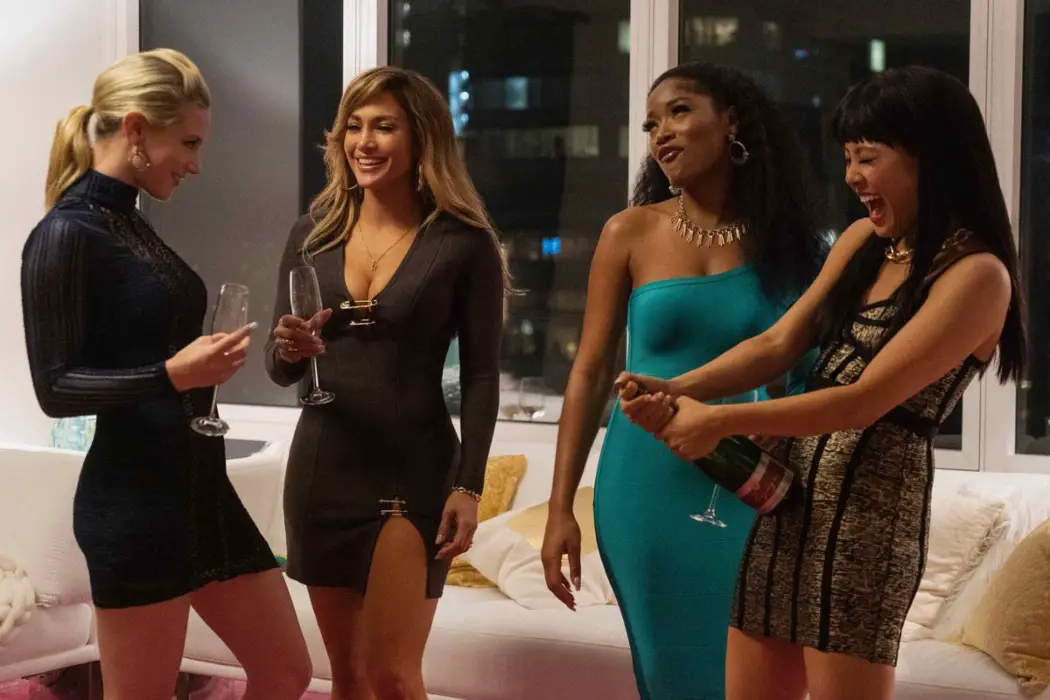HUSTLERS: A Glamorous, Femme Crime Film

Hustlers is director Lorene Scafaria’s third feature, after 2012’s apocalyptic rom-com Seeking a Friend for the End of the World and the 2015 comedy-drama The Meddler. All of her films show an enormously competent filmmaker, capable of tackling different subjects, genres, and themes, and with Hustlers, she has given us her take on the true crime genre. Inspired by the New York magazine article “The Hustlers at Scores” by Jessica Pressler, the film follows a group of strippers who, after the crash of 2008, begin drugging and stealing from clients. It has inevitably been compared to Martin Scorsese, and the film lives up to those comparisons. But it’s also unlike anything Scorsese has made, relishing in a lively feminine energy, the same way that Michael Bay combined Scorsese with his signature testosterone-pumped gym rat energy in 2013’s underrated Pain & Gain.
More than any Scorsese film, however, what kept popping into my head during Hustlers was Cardi B’s “Money.” The song was used extensively in the film’s trailer, to great effect. It may be one of capitalism’s few masterpieces, a track that encapsulates the glamour of having money – not merely what it can buy or what it represents, but the act of having cash itself. Cardi likes the jets and enjoys the sex, but in the end, “there’s nothing in this world I like more than checks”.
“I got a baby, I need some money”
Hustlers reminded me of the song’s money-fetishization early on, when veteren stripper Ramona (Jennifer Lopez) meets the younger Dorothy (Constance Wu) for the first time. “Doesn’t money make you horny?” Ramona asks. I was further reminded of “Money” later, specifically near the end of the track where money is replaced as the thing Cardi loves more than anything by Kulture (as in, Kulture Kiari Cephus, her baby daughter). Similarly, Ramona is also a mother, and when her need for time off is rejected by an uncaring club manager (Jon Glaser), who wonders why the fathers who work for him don’t need time off, the point becomes clear: the rules are different. More is expected from these women and less is given.

Motherhood humanizes the protagonists, as well as offering strong motivation so their actions later are more understandable. But more than anything, it further feminizes the film, making clear the power imbalance between the women and the CEOs and executives they rob. Sixty-five years ago, Gentlemen Prefer Blondes offered a defense of gold-digging, wondering aloud how women desiring money is any different from men desiring sex. Hustlers may do the same thing for gold-snatching: how is what our anti-heroines are doing any different from the thievery that led their victims to their fortunes? And in a society that puts women at a disadvantage, can you blame them for refusing to play by the rules?
“Ten different looks and the looks all kill”
Stylistically, the film is presented with the same dilemma that films like Spotlight and The Big Short were. How do you make the blandness of the 21st century cinematic? Scafaria proves herself much more equipped for this task than Tom McCarthy and Adam McKay, particularly in her excellent use of long takes. The scenes set in New York City bars and strip clubs are drenched in gorgeous neon sleaze, but even scenes in houses and penthouses manage to pop, with Scafaria making the colorless seem lavish – a standout Christmas party scene especially notable. It’s assisted by a period-specific soundtrack, with Sean Kingston, Flo Rida, and Blackout-era Britney Spears being used with the same sort of zest Scorsese brings when indulging in his love for The Rolling Stones. Yet if any soundtrack pick will stick in your mind, it’ll be the choice of Fiona Apple’s “Criminal” during Lopez’s introductory pole dance, which might actually top the use of Ginuwine’s “Pony” in Magic Mike.

The performances are also remarkable, with Lopez giving a career-best performance, her first in two decades to live up to the promise of Selena and Out of Sight, and Wu matching her, their characters’ relationship tender but hiding some spite underneath. An early training scene (with an underutilized Cardi B) sets up the closeness of their relationship, with more than a little queerness thrown it – though it doesn’t exactly pay off.
Cardi and Lizzo are given smaller roles than one would hope, even if both prove themselves as skilled on screen as on the mic. (Lizzo gets to play her flute, too!) Keke Palmer and Lili Reinhart are also strong presences as Dorothy and Ramona’s main partners in crime, Reinhart providing solid comic relief as a woman who vomits at the slightest bit of stress. A film that seemingly cast as many prominent women stars as it could, Hustlers lives up to the hype.
Hustlers: “That’s me bustin’ they bubble”
As with any crime film, the dream can’t go on forever, and a climax set to Lorde’s “Royals” (“Let me live that fantasy”) proves the fantasy just that. In the same way, the fantasy of an ethical Hollywood was also crushed when it came out that Samantha Barbash, the real-life Ramona Vega, hadn’t approved of the film or been consulted on it and was considering a lawsuit. It’s telling that Jordan Belfort profited off of The Wolf of Wall Street, but a film that seems so unwavering in its support of sex workers still doesn’t consider them entitled to their stories.
Between that and the element of drugging men (a soft spot for the same people who are totally cool with Walter White making meth, apparently), Hustlers won’t be loved by everybody. But as both entertainment and an addition to the world of crime cinema, it’s an exceptional work; fun, thoughtful, and satisfying.
What did you think of Hustlers? What are your thoughts on the ethics of using someone’s story without their permission? Tell us your thoughts in the comments below!
Watch Hustlers
Does content like this matter to you?
Become a Member and support film journalism. Unlock access to all of Film Inquiry`s great articles. Join a community of like-minded readers who are passionate about cinema - get access to our private members Network, give back to independent filmmakers, and more.












